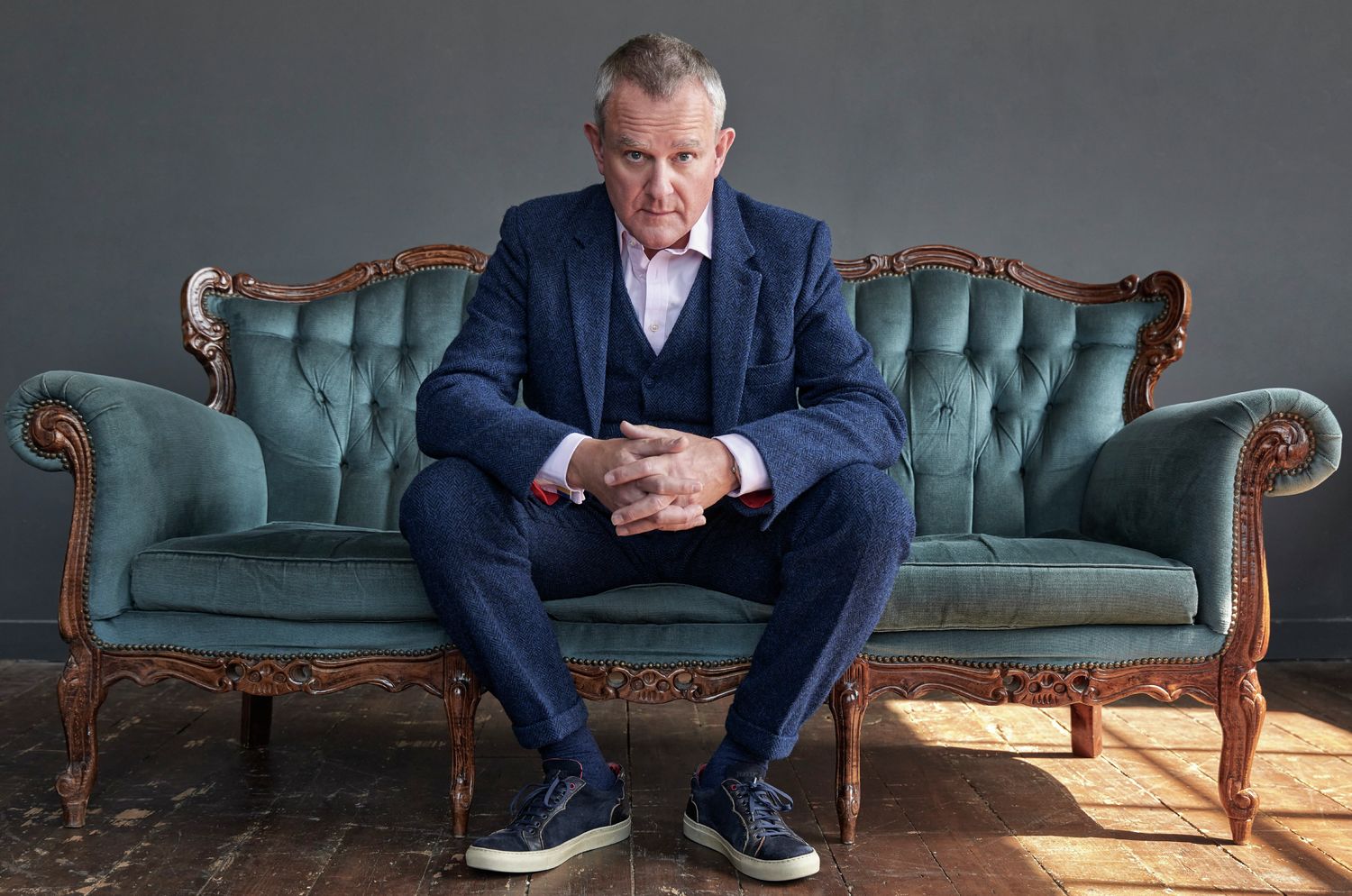Hugh Bonneville was born, rather fittingly, in Paddington. His mother was a nurse and his father a leading surgeon; their commitment to the NHS was something that Bonneville had always admired. He only discovered his mother’s second job years later, when he recognised a newspaper photo of MI6’s headquarters – the very place they’d dropped her off every morning.
Bonneville grew up surrounded by “the white noise of culture with a small c.” His father was a gifted pianist, a talent Hugh himself always envied (“I tried piano and was rubbish – it drove me nuts!”). Instead, he fell in love with the theatre, inspired by Peter Brook’s 1970 production of A Midsummer Night’s Dream. The play remains one of Bonneville’s favourites, not least because his first professional role was as an understudy to Ralph Fiennes’ Lysander. He lauds it as “accessible to young people [and] a great way into the canon.”
At Sherborne School, Bonneville began acting more seriously and soon joined the National Youth Theatre: “the most profound shift in my childhood”. Grateful for the privilege of such opportunities, he is outspoken about the “disgraceful” cuts to the arts in state schools by successive governments.
Inspired by a teacher who “made the New Testament come alive,” Bonneville studied Theology at Corpus Christi, hoping to later become a barrister. His supervisors included future Archbishop Rowan Williams –“I spent most of my supervisions wondering what lived in his beard!”, he jokes. But he spent far more time in the theatre than in the library: “I’m ready now to go to university – I wasn’t then.” Ultimately, though, Bonneville believes that “university should be as much about exploring artistic expression, fly fishing, or whatever you’re into, as it should be about the dry academics.”
“University should be as much about exploring artistic expression, fly fishing, or whatever you’re into, as it should be about the dry academics”
Preferring plays to sketches, Bonneville was only ever “tangential” to the Footlights (“it wasn’t going through a great patch”). It was nonetheless there that he began collaborating with Chris Luscombe – a partnership that would later continue at the Royal Shakespeare Company (RSC). Instead, he was active within the ADC and the Fletcher Players, staging “exploratory and a bit nutty” shows at the Corpus Playroom, which is a venue he fiercely defends: “I’ll certainly withdraw any support to my college if they ever stop it being a theatre space.” Bonneville also staged plays in Ted’s Passage around Christmas (“there was quite a lot of mulled wine involved!”), including an adaptation of the Canterbury Tales which involved “lots of crossdressing and stuff you’re probably not allowed to do these days!”
Nevertheless, Bonneville is sceptical of calls to introduce a theatre studies course at Cambridge, believing it would lead to the university’s acting scene becoming dominated by drama students. “Acting is about drawing on life experience,” he says, praising the “variety and happy amateurism” unique to the Oxbridge drama scene that meant he often found himself working alongside NatScis, Medics, and Engineers.
Abandoning his plans of becoming a barrister, Bonneville joined the RSC, beginning a stage career he still misses immensely. “Theatre teaches you about community and collective responsibility,” Bonneville says, noting that Hollywood’s “Brit Pack” owe their prized discipline to Britain’s strong theatrical tradition. He cites American producer David E. Kelly: “You Brits turn up on time, respect the script and your colleagues.”
“Theatre teaches you about community and collective responsibility”
An early film breakthrough was Richard Curtis’ Notting Hill, where Bonneville shared scenes with real-life theatre friends Emma Chambers, Gina McKee, and Tim McInnerny. Many of his scenes were cut, but Bonneville was luckier than others. Toby Jones appeared in a scrapped opening where Hugh Grant bribes locals to attend a book launch he’d forgotten he was hosting, while Sally Phillips’ “four-beat storyline” was cut entirely.
For many, Bonneville is synonymous with Downton Abbey’s Lord Grantham. He appreciates his character’s liberal conservatism – a reflection of writer Julian Fellowes’ belief that “people try to be good” – and embraces the show as “a complete piece of fantasy, a bit like Star Trek!”. His favourite character? The beleaguered footman Mr Moseley, played by the “Chaplin-esque” Kevin Doyle, who, Bonneville says, “provides great humour and great pathos in the twinkling of an eye.”
The beloved franchise concludes this September with a third and final film – emotional, good fun, and “full of surprises – even for me,” Bonneville tells me. There’s a “scandal and a county show…we haven’t suddenly got into a spaceship and gone off into a parallel universe!”. Above all, it’s a tribute to the franchise’s late star, Dame Maggie Smith, whose brilliance endured despite the frustrations of ageing: “You’d wonder which Maggie you were getting today… the brilliantly funny, sharp-witted one, or the one who’s annoyed with herself because she’s not as fit as she once was.”
If Downton made Bonneville a household name, his performance as Mr Brown in Paddington made him beloved by a new generation. Although Paddington 2 is now hailed as one of the greatest films ever, Bonneville was initially sceptical. “I didn’t think it was going to work…shows how much I know,” he laughs. “A washed-up actor wanting to put on a play in the West End – where’s the high stakes in that?”
“I didn’t think [Paddington] was going to work…shows how much I know”
Now, however, he thinks the second film captures Michael Bond’s spirit even more closely than the first, crediting director Paul King’s unique approach to tone. During the final showdown, Mr Brown was originally scripted to punch Hugh Grant’s villain. However, King felt this moment “wasn’t very Paddington.” Instead, the scene was rewritten to have Mr Brown lob a coconut shy ball, delivering justice Paddington-style. An earlier scene was also reshot to include a flashback to “Bullseye Brown’s” coconut-shy heyday, where “in true Paul King genius, [Brown] doesn’t just hit one coconut – he knocks down three with one ball!” In short, Bonneville says that Curtis, Fellowes, and King all share “a positive outlook on humanity.” “The word escapism can apply to Paddington, Downton, to most of Richard Curtis’s work – and what’s wrong with that? That’s what entertainment is for!”
Bonneville returns as Ian Fletcher – the hapless bureaucrat from 2012 and W1A – in a new series, 2026, where he is appointed ‘Director of Integrity’ for the FIFA World Cup. It’s a fitting role for someone who despises ‘safety first’ culture. “In Britain, we’re so good at creating jobsworths,” Bonneville argues. “They’re incapable of thinking outside the box [or] using common sense – it incenses me and amuses me.”
Offstage, Bonneville enjoys hiking in the South Downs and dreams of returning to sailing – a hobby he shared with his father. “I grew up being a crew member – it’s high time I got back into a boat.” Most of all, though, he hopes to return to Shakespeare: “maybe Leontes in The Winter’s Tale, or Benedick in Much Ado – though I’m probably getting old enough to play King Lear soon!”. Bonneville laughs when I point out that age has never stopped Ian McKellen before. Encouragingly, Bonneville believes theatre’s value will only grow: “With the rise of AI, live experiences are now at a premium – they remind us we’re alive.” After all, he smiles, “whenever a joke is told in a pub, there’s theatre.”


